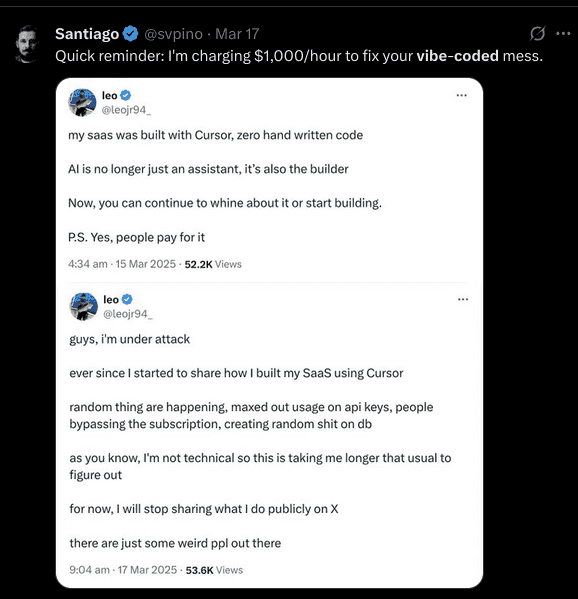AI-Powered Code Generation (GitHub Copilot, ChatGPT) Explained for Recruiters

AI-powered code generation tools have become some of the hottest technologies in software development. Let's break down what recruiters need to know about these tools and their implications for hiring.
What is AI-Powered Code Generation?
These are tools that use large language models (LLMs) to suggest or generate code based on natural language prompts. The two most prominent examples are:
- GitHub Copilot - Directly integrated into code editors
- ChatGPT - General purpose chatbot that can write code
- Cursor - Code editor that uses AI to write code
Think of them like supercharged autocomplete for programming. Developers can write a comment describing what they want ("Create a login form with email validation") and the AI suggests code implementations.
How Developers Use These Tools
Common Use Cases:
- Generating boilerplate code (repetitive setup code)
- Exploring different implementation approaches
- Learning new programming languages/frameworks
- Debugging error messages
- Writing test cases
Example Workflow:
- Developer writes: "// Function to calculate Fibonacci sequence"
- AI suggests complete code implementation
- Developer reviews/modifies the suggested code
- Code gets added to the project
Why This Matters for Recruiting
What's Changed:
- Faster onboarding: Juniors can ramp up quicker with AI assistance
- Shifted skills: More focus on code review vs raw typing
- New expectations: Many developers now consider these tools essential
What Hasn't Changed:
- Core understanding still required to evaluate AI suggestions
- Architecture decisions still require human expertise
- Debugging skills remain critical when AI-generated code fails
Interview Considerations
Green Flags 🟢
- Candidates who can explain AI-generated code line-by-line
- Developers using AI for boilerplate but writing complex logic manually
- Engineers who verify AI suggestions with testing
Red Flags 🚩
- Can't explain basic code without AI assistance
- Relies exclusively on AI without understanding outputs
- No process for validating AI-generated code
FAQ for Recruiters
Q: Will AI replace developers?
A: Not anytime soon. Current tools are more like powerful assistants than replacements.
Q: Should candidates list AI tools on resumes?
A: It's a plus but not required. Focus on fundamental coding skills first.
Q: Do startups use these differently than enterprises?
A: Startups often adopt faster, while enterprises may have security/compliance restrictions.
The Reality Check Meme
Vibe coding
Vibe coding is this concept of creating code only with Cursor. It does work... up to a point. It doesn't last very long until it breaks.
I use Cursor and I love it. I use it to write code, but I don't use it to write code without reviewing it. And let's be honest, the code is not even the hard part of the being a developer.
The hard part is the architecture, the design, the problem solving, the debugging, the testing, the deployment, the monitoring, the scaling, the security, the maintenance, the documentation, the communication, the leadership, the management, the mentoring, the recruiting, the hiring, the firing, the...
Key Takeaways
- AI coding tools are becoming standard developer utilities
- They amplify productivity but don't replace core skills
- Look for candidates who use AI responsibly as a tool
- Fundamental programming knowledge remains essential
- Expect to see these tools listed on resumes more frequently
Want to go deeper? I wrote about how AI is changing tech hiring in another post.



